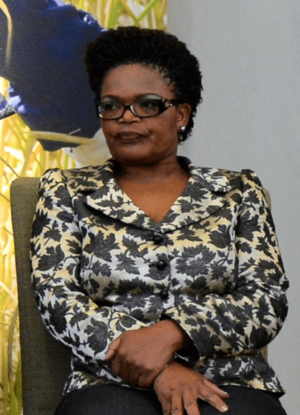Beatrice Mtetwa facts for kids
Beatrice Mtetwa, born in 1957, is a well-known lawyer from Zimbabwe. She is famous around the world for helping journalists and for protecting freedom of speech. In 2008, a big newspaper called The New York Times described her as "Zimbabwe's top human rights lawyer." She has worked hard to defend people's rights and ensure fair treatment for everyone.
Contents
Beatrice Mtetwa's Legal Work
Early Career and Human Rights Focus
Beatrice Mtetwa was born in Swaziland. She studied law at the University of Botswana and Swaziland, finishing in 1981. For two years, she worked as a prosecutor in Swaziland. In 1983, she moved to Zimbabwe and continued as a prosecutor until 1989.
After that, she started her own law practice. She soon began to focus on human rights law. This means she helps people whose basic rights have been taken away. She once successfully challenged a law that allowed the government to control groups that help people. She also questioned the results of some elections in 2000. Mtetwa has said she does this work "because it's a job that's got to be done."
Defending Journalists and Free Speech
Mtetwa is especially known for defending journalists who have been arrested. These include both local and international reporters. For example, in 2003, she helped The Guardian reporter Andrew Meldrum. She got a court order to stop him from being sent out of the country. She delivered it to officials just minutes before his plane was to leave.
She also helped reporters Toby Harnden and Julian Simmonds from London's Sunday Telegraph. They were arrested during the 2005 election. Mtetwa helped them get cleared of charges. In 2008, she secured the release of New York Times reporter Barry Bearak. She also defended many local journalists before the 2008 presidential election.
Mtetwa & Nyambirai Law Firm
In 2006, Beatrice Mtetwa and Tawanda Nyambirai started their own law firm, Mtetwa & Nyambirai Legal Practitioners. Over the years, it has become one of Zimbabwe's leading law firms. They have handled many important cases.
One of their biggest clients is Econet Wireless, a large telecommunications company in Zimbabwe. The firm has been involved in many landmark cases for Econet. These cases have helped shape the law in Zimbabwe. The firm also works on many high-profile human rights cases. For example, they helped in the recovery of activist Jestina Mukoko in 2008. The firm has grown to handle all kinds of legal matters in Zimbabwe.
Challenges and Recognition
Facing Difficulties
Mtetwa has faced many challenges because of her work. In 2003, she was arrested. She reported being treated roughly by police before being released. She later tried to file charges against the officers. In 2007, police reportedly attacked Mtetwa and her colleagues during a protest.
She has learned to protect herself by making sure media are present. She said, "in the glare of cameras I find that people don't want to do what they would want to do." In March 2013, Mtetwa was arrested again while helping a client. Her phone was taken, and she was accused of stopping justice. She was held for over a week. However, a high court judge ordered her release. In November 2013, a magistrate ruled that she had done nothing wrong.
International Awards and Honors
Beatrice Mtetwa has received many awards for her brave work. In 2005, she won the International Press Freedom Award. This award recognized her defense of journalists in a country where laws were used against them. She also received the Burton Benjamin Memorial Award for Lifetime Achievement in 2008.
Legal groups have also honored her. In 2009, she won the Ludovic-Trarieux International Human Rights Prize. This award is given to a lawyer who has defended human rights throughout their career. In 2010, she received the International Human Rights award from the American Bar Association.
In 2011, she was given the Inamori Ethics Prize by Case Western Reserve University in the US. In 2014, she received the International Women of Courage Award. Several universities have also given her honorary degrees. These include St. Francis Xavier University in Canada (2013), the University of Bath in the UK (2013), and Rhodes University in South Africa (2016). These degrees recognize her important work in protecting human rights.
See also
 In Spanish: Beatrice Mtetwa para niños
In Spanish: Beatrice Mtetwa para niños
 | William L. Dawson |
 | W. E. B. Du Bois |
 | Harry Belafonte |


